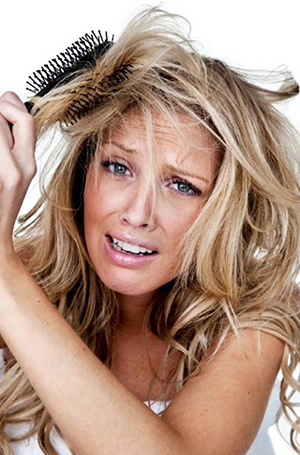 Sulfates are notorious for stripping oil from hair and contribute to tangling, knots and breakage. As extensions are technically ‘dead’ hair and are no longer connected to a follicle (the hair’s natural oil source), sulfate shampoos should not be used. In fact, products which contain sulfates make our hair dry, straw-like and frizzy.
Sulfates are notorious for stripping oil from hair and contribute to tangling, knots and breakage. As extensions are technically ‘dead’ hair and are no longer connected to a follicle (the hair’s natural oil source), sulfate shampoos should not be used. In fact, products which contain sulfates make our hair dry, straw-like and frizzy.
Sulfates are notorious for stripping oil from hair and contribute to tangling, knots and breakage. As extensions are technically ‘dead’ hair and are no longer connected to a follicle (the hair’s natural oil source), sulfate shampoos should not be used. In fact, products which contain sulfates make our hair dry, straw-like and frizzy.
There are many do’s and don’ts that salon stylists tell you when it comes to using shampoos, but most of us are aware of only a few. So, without further ado, here are the facts of why sulfates are bad for hair extensions.
What sulfates are we talking about?
Sulfate – a salt or ester of sulfuric acid, containing the anion SO42− or the divalent group —OSO2O. The best way to deal with the problem is to identify it first! Sulfates are used in shampoos as the cleaning agents, however the trouble starts when they do their job too well. Shampoos are used to clean our hair and scalp of dirt but sulfates remove almost all of the natural oils produced by our scalp to nourish the hair. You can identify a product that has this chemical by the lather and froth that it produces. Regular washes with such a product will eventually have the hair looking dry and rough.
Why are sulfates bad for hair extensions?
As hair extensions are exactly that – extensions, they are not part of the natural growing hair and hence, have no way of receiving nourishment. Natural hair will eventually receive oils from the scalp and will get rejuvenated but hair extensions have no way of getting nourishment after the sulfates have cleaned them of their oils. Even some of the best extensions on the market made of 100% natural human hair can become brittle and coarse after a few sulfate shampoo washes. Eventually, you will notice that the hair extensions are looking dull and even colorless as sulfates are also capable of removing the color of them.
How to identify if your shampoo contains sulfates?
Products that are free of this chemical might not produce much lather and they are gentle cleansers. So, they may not clean as well as a regular sulfate shampoo but they will certainly take care of your extensions as well as your hair.
A little research should do the trick and you can find out whether the shampoo has sulfates by reading the list of ingredients on the packaging. Any chemical name ending with “sulfate” is a definite no-no. Shampoos made for sensitive scalps and natural cleansers are usually without sulfates.
Your stylist should know
The best way to know what to use for your particular set of extensions is to ask the stylists at your hair salon. At Carla Lawson, we use only sulphate free shampoos, conditioners and styling products that nurture and protection your hair and your extensions.










